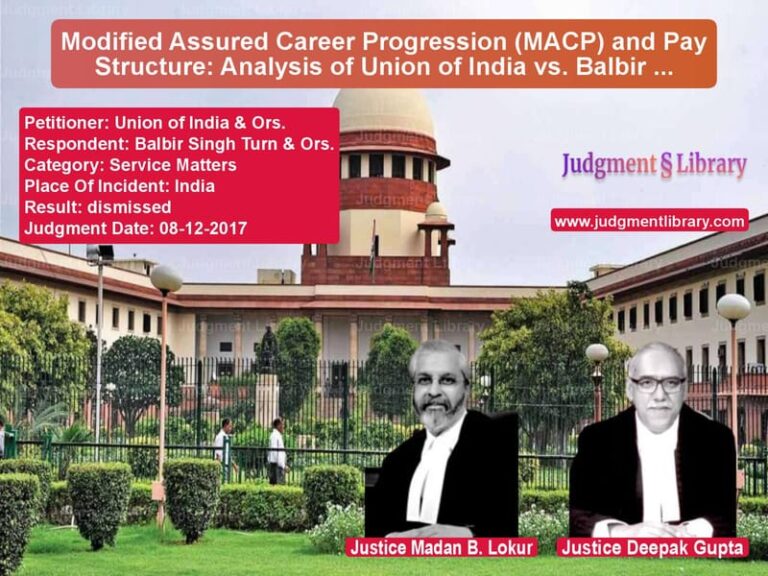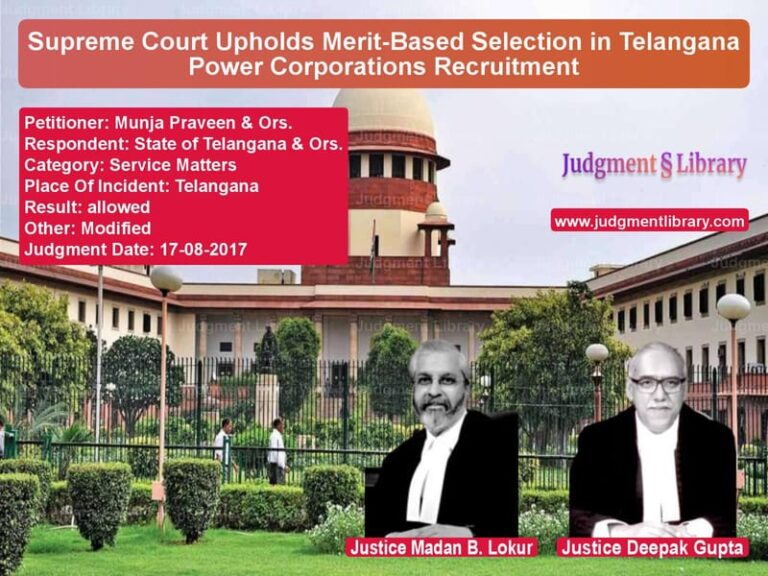Cooperative Society Membership Disqualification: Supreme Court Orders Fresh Inquiry
The case of Deepak Ananda Patil v. The State of Maharashtra & Ors. concerns the mass disqualification of members from a cooperative sugar factory in Maharashtra. The Supreme Court was called upon to decide whether the disqualification process was conducted in a fair and transparent manner and whether the principles of natural justice were upheld.
Background of the Case
The dispute arose when complaints were filed against approximately 2,000 members of Shri Chhatrapati Rajaram Sahakari Sakhar Karkhana Limited, a cooperative society engaged in sugar production. The complaints alleged that these members did not meet the eligibility criteria prescribed under Bye-law 17-A of the Maharashtra Cooperative Societies Act, 1960, which required members to:
- Be at least 18 years old;
- Own or lease agricultural land within the jurisdiction of the factory; and
- Cultivate sugarcane on a minimum area of 10 gunthas.
Following these complaints, the Regional Joint Director (Sugar) initiated an inquiry and, on 14 February 2020, ordered the deletion of 1,415 members from the cooperative society. The disqualified members appealed this decision before the Minister of Cooperation, who upheld the disqualification.
Legal Issues Considered
The Supreme Court examined the following key legal questions:
- Whether the disqualification process adhered to the principles of natural justice.
- Whether individual members were given an opportunity to present their defense.
- Whether the findings of ineligibility were based on concrete evidence.
- Whether the Registrar of Cooperative Societies had the jurisdiction to disqualify members after registration.
Arguments by the Appellants (Disqualified Members)
The appellants contended that:
- The disqualification process was arbitrary and lacked individual assessment.
- A single omnibus notice was issued, listing members without specific allegations against them.
- The inquiry was rushed to comply with a High Court directive to conclude the matter within two months.
- The report of the Committee that verified the allegations was not shared with the affected members.
- The disqualified members were denied a fair hearing and an opportunity to submit evidence supporting their eligibility.
Arguments by the Respondents (State of Maharashtra & Complainants)
The respondents argued that:
- The disqualification was necessary to ensure compliance with cooperative society bye-laws.
- The complaints were based on credible evidence showing that the members did not meet the eligibility requirements.
- The findings were reviewed and confirmed by the appellate authority.
- The affected members failed to challenge their disqualification effectively before the High Court.
Supreme Court’s Judgment
The Supreme Court ruled as follows:
- Violation of principles of natural justice: The Court held that the disqualified members were not provided with specific allegations or an opportunity to respond.
- Lack of individualized inquiry: The Court noted that the disqualification was based on a general notice rather than an examination of individual records.
- Failure to disclose the Committee report: The Court found that the verification report, which formed the basis for disqualification, was not shared with the affected members.
- Order of remand: The Court set aside the disqualification orders and directed the Regional Joint Director (Sugar) to conduct a fresh inquiry.
Analysis of the Judgment
The ruling emphasizes the importance of due process in cooperative society governance and protects members from arbitrary disqualification.
Implications for Cooperative Societies
- Societies must ensure transparency in membership eligibility verification.
- Disqualification of members must be based on individualized assessment.
- Members must be given access to all relevant reports and documents.
Implications for Government Authorities
- Regulatory bodies must adhere to principles of natural justice.
- Orders affecting a large number of individuals must be based on clear and specific evidence.
- Authorities must provide affected parties with an opportunity to present their case.
Implications for Future Membership Disputes
- The judgment reinforces the necessity of procedural fairness.
- Large-scale disqualifications must be subject to judicial scrutiny.
- The decision sets a precedent for cooperative societies to follow due process.
Conclusion
The Supreme Court’s judgment ensures that cooperative society members are not arbitrarily removed without due process. By directing a fresh inquiry, the Court has upheld the principles of fairness and transparency in cooperative governance.
Petitioner Name: Deepak Ananda Patil.Respondent Name: The State of Maharashtra & Ors..Judgment By: Justice Dhananjaya Y Chandrachud, Justice Pamidighantam Sri Narasimha.Place Of Incident: Maharashtra.Judgment Date: 04-01-2023.
Don’t miss out on the full details! Download the complete judgment in PDF format below and gain valuable insights instantly!
Download Judgment: deepak-ananda-patil-vs-the-state-of-maharas-supreme-court-of-india-judgment-dated-04-01-2023.pdf
Directly Download Judgment: Directly download this Judgment
See all petitions in Public Interest Litigation
See all petitions in Contract Disputes
See all petitions in Judgment by Dhananjaya Y Chandrachud
See all petitions in Judgment by P.S. Narasimha
See all petitions in allowed
See all petitions in Remanded
See all petitions in supreme court of India judgments January 2023
See all petitions in 2023 judgments
See all posts in Civil Cases Category
See all allowed petitions in Civil Cases Category
See all Dismissed petitions in Civil Cases Category
See all partially allowed petitions in Civil Cases Category







